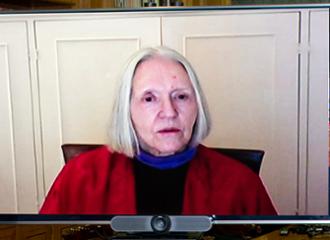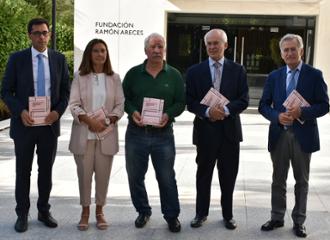- ES
- EN
Events
Start of main content

Masterclass 3: Inequality & Social Cohesion: A Global Perspective
Social Sciences Master Classes Monday, July 8 to Wednesday, July 10, 2019 10:00 hours Madrid
General information:
Venue: Fundación Ramón Areces, Calle Vitruvio 5, 28006 Madrid.
Limited capacity.
In cooperation with:
London School of Economics (LSE)
- Description
- Programme
The programme is aimed at professionals who possess at least an undergraduate qualification and who are working in business, academia, national and local governments in Spain, and research centres.
Places are limited to 25 participants for the 3 days programme and will be taught in English, for which each candidate must have a high level. Successful candidates will be offered a place on merit by a Selection Committee consisting of representatives of LSE and Fundación Ramón Areces who will meet by 25th June.
Inscription
Persons wishing to register for this programme must make their registration online through this website, before 24th June . They should send the following documents by e-mail: i.medrano@lse.ac.uk.
- Currículum Vítae (in Spanish or English).
- Personal statement, in English, on why you want to attend the programme (maximum 400 words).
Introduction
On the first day of this Masterclass Dr Jennifer Sheehy-Skeffington, begin with psychological perspective on inequality and how it shapes the way we think about ourselves and others. She will divide the day in three sessions. First, she will provide an introduction to the psychology of egalitarianism, paying particular attention to underlying mechanisms. This session will conclude with a discussion of recent work theorising how inequality understanding is both evolved and affected by context. The second session will be an introduction to the political psychology of egalitarianism and how it shapes downstream social attitudes, moving toward recent work on how egalitarianism shapes perceptions of inequality itself. The last session will focus on the ‘social consequences of inequality’. Here, Dr Sheehy-Skeffington will discuss work on how SES affects decision-making, particularly among those who are in disadvantaged economic situations.
On Tuesday, Dr Mark Fransham will talk about inequalities between and within countries. These inequalities have always been there, but he will unpack the ways in which they may be growing or decreasing? In the first session we will discuss the scale at which it makes sense to measure geographic (spatial) inequality, and the question of comparability of units. We will explore spatial inequalities at different scales: between countries, between regions within countries, and within cities and regions. Using data from OECD countries and the EU we will investigate trends in the unequal spatial distribution of income, labour market outcomes and health outcomes. The next session will be on The causes of spatial inequality. Here, Dr Fransham will explore whether place is a fundamental cause of spatial inequalities, or do spatial patterns of inequality simply reflect the outcomes of processes that have other, non-geographic causes? Focusing on regional economic inequality and urban residential segregation, we will use these perspectives to examine the hypothesised causes of geographic inequality. We will also consider what different conclusions mean for public policies that aim to reduce spatial inequality. The final session will be on The consequences of spatial inequality. The focus here is on why, if at all, geographic inequalities matter? We will examine the theory and the evidence around ‘neighbourhood effects’, the theory that where you live has a causal effect on a variety of social outcomes. We will also consider the relationship between regional inequality and the recent rise of populist politics across Europe.
On the final day, Dr Aaron Reeves will explore health inequalities through the lens of social cohesion. In the first session, he will outline trends and drivers in health inequalities across countries and over time. He will facilitate a discussion around the link between economic inequality and health, paying particular attention to the role of social cohesion in potentially mediating that relationship. In the second session, Dr Reeves will use evidence drawn from the political economy of health inequalities to explore whether health inequalities are a failure of social cohesion. He will take as an example the response to the economic crisis in Europe and consider whether pursuing austerity policies has undermined cohesion through exacerbating health inequalities.
Monday, July 8
The psychological dimension to inequality
10:00 h
The psychological dimension to inequality
11:30 h
Break
12:00 h
Loving or loathing inequality – individual differences in egalitarianism and why they matter
Jennifer Sheehy-Skeffington
13:30 h
Break
15:00 h
Inequality on the mind – how socioeconomic differences shape decision-making
Jennifer Sheehy-Skeffington.
Tuesday, July 9
The geographical dimension to inequality
10:00 h
Trends in spatial inequality
11:30 h
Break
12:00 h
The causes of spatial inequality
Mark Fransham
13:30 h
Descanso
15:00 h
The consequences of spatial inequality
Mark Fransham
Wednesday, July 10
The health dimension to inequality
9:30 h
Health inequalities: What is the role of social cohesion?
11:30 h
Break
12:00 h
Are health inequalities a failure of social cohesion?
Aaron Reeves
14:00 h
Certificates and Cocktail Reception
-
 Activities related
Activities related
-
 Projects related
Projects related
-
 News related
News related
-
 Publications related
Publications related
-
 Thesis related
Thesis related
-
1
Jun
2023
Coloquio online Rare Diseases: Policies for addressing complex medical issues Online, Thursday, 1 June 2023, 19:00 hours
-
4
Jul
2023
Coloquio online 90 seconds to Midnight: Are we really on the edge of a new cold war, or worse? online, Tuesday, 4 July 2023, 19:00 hours
-
27
Feb
2025
Conference The Economics of Healthcare in an Ageing Society: Global Trends Madrid, Jueves, 27 de febrero 2025, 19:00 horas
- Allocation of resources and decision-making within the household: implications on individual wellbeing measured through self-reporting health levels 2015 Senior Researcher : María Teresa Blázquez Cuesta Research Centre or Institution : Universidad Autónoma de Madrid.
- Dependency of the elderly in Europe: consequences of reforms on family care 2015 Senior Researcher : Matthias Kredler Research Centre or Institution : Universidad Carlos III de Madrid.
- Towards an understanding of parents' expectations of the returns on education in developing countries 2015 Senior Researcher : Alex Armand Research Centre or Institution : Universidad de Navarra. Pamplona.
-

Saskia Sassen: “La tecnología está matando a algunas ciudades”
Published on 12/01/2020
-

La tasa de "ninis" vuelve a los niveles de antes de la crisis
Published on 09/18/2019
- Multigenerational Inequality in Spain Senior Researcher : Andrea Pîzzo Research Centre or Institution : Universidad Carlos III de Madrid.
End of main content



